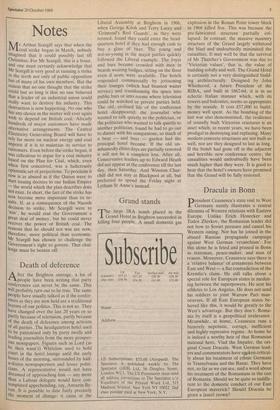Dracula in Bonn
President Ceausescu's state visit to West Germany nastily illustrates a central dilemma of Western relations with Eastern Europe. Unlike Erich Honecker and Todor Zhivkov, the Romanian leader did not bow to Soviet pressure and cancel his Western outing. Nor has he joined in the absurd Russian propaganda campaign against West German `revanchism'. For this alone he is feted and praised in Bonn as stateman, peace-maker, and man of reason. Moreover, Ceausescu says there is a 'relative balance' of armaments between East and West — a flat contradiction of the Kremlin's claim. He still talks about a special role for European states in mediat- ing between the superpowers. He sent his athletes to Los Angeles. He does not send his soldiers to joint Warsaw Pact man- oeuvres. If all East European states be- haved like this, it would be greatly to the West's advantage. But they don't. Roma- nia by itself is a geopolitical irrelevance. Meanwhile, at home, Ceausescu runs a bizarrely nepotistic, corrupt, inefficient and highly repressive regime. At home he is indeed a worthy heir of that Romanian national hero, Vlad the Impaler, the ori- ginal Count Dracula. West German lead- ers and commentators have spoken critical- ly about his treatment of ethnic Germans in Transylvania and the Banat. They have not, so far as we can see, said a word about his treatment of the Romanians in the rest of Romania. Should we be quite so indiffe- rent to the domestic conduct of our East European maverick? Should Dracula be given a laurel crown?


















































 Previous page
Previous page